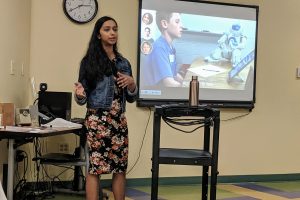
What do Girl Scouts and robots have in common? Helping people.
Gopika Ajaykumar—a second-year PhD student in computer science affiliated with the Johns Hopkins Malone Center for Engineering in Healthcare—provided examples of just how robots are working to help people at the Maryland Science Center’s inaugural Girls Scouts Robotics Workshop on June 1. The hands-on workshop provided multiple types of robots for the Girl Scouts to learn about and interact with. The middle-schoolers also built circuits, used software to program robots, and created a robot prototype using easily accessible materials.
According to statistics from the Department of Labor, women hold only 16 percent of the nation’s engineering jobs, 21 percent of its computer programming jobs, and 25 percent of its math-related jobs. The Maryland Science Center hopes to improve those numbers by introducing girls to STEM fields at an early age.
“We have a long history of running programs for the Girl Scouts with our Camp-In program and love working with troops from across Maryland, Virginia, and Pennsylvania,” says Alysia Korn, the education program coordinator for the Maryland Science Center. “The Camp-In program is geared towards younger Girl Scouts, so it has been very important for us to develop a program that can engage older Girl Scouts. We want to continue to inspire these girls and empower them to consider careers in STEM as they move into high school and college.”
Ajaykumar says she was excited to present at the workshop because she understands the impact of being introduced to STEM at an early age. The programming and engineering courses she took in middle and high school helped to foster her interests in writing code and building things—interests which later led to her involvement with robotics upon entering college and ultimately inspired her to pursue a career as a robotics researcher.
In her presentation to the Girl Scouts, Ajaykumar explained how robots can provide physical, social, and cognitive support to humans. She also described how robots are currently assisting humans with daily tasks in these core areas.
Ajaykumar’s research lies in human-robot interaction. She is currently working toward the development of assistive robots in the Intuitive Computing Laboratory, led by John C. Malone Assistant Professor of Computer Science Chien Ming-Huang.
“As robots begin to make their way into classrooms, hospitals, and even homes, it becomes critical for people, especially those without specialized programming or robotics experience, to be able to easily program and re-task their robots,” Ajaykumar says.